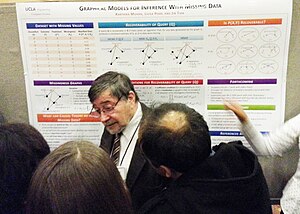Judea Pearl

Judea Pearl,
an Israeli American computer scientist and pioneer in artificial intelligence, professor of computer science at the Cognitive Systems Laboratory of the University of California, Los Angeles (UCLA). Judea Pearl is known for developing the probabilistic approach to artificial intelligence and for the formalization of causal reasoning [2] .
Contents
Scout
In 1980 Judea Pearl researched on search algorithms and introduced the concept of Null Window Alpha-Beta search with the boolean procedure TEST of the Scout Algorithm, which was the foundation of NegaScout, Principal Variation Search, NegaC* and MTD(f).
Biography
Quote from the Franklin Institute [3] :
Pearl was born in 1936 in Tel Aviv, Israel. He earned his B.S. in electrical engineering from the Technion in Haifa, Israel in 1960 and went on to earn a masters degree in physics from Rutgers University in 1965 and his Ph.D. in electrical engineering the same year from the Polytechnic Institute of Brooklyn. He worked at RCA Research Laboratories [4] in Princeton until 1970 and has been at the University of California, Los Angeles ever since.
Awards
Judea Pearl's numerous scientific honors include the IJCAI Research Excellence Award in 1999, the Lakatos Award in the philosophy of science in 2001, the ACM-AAAI Allen Newell Award in 2003, and the Benjamin Franklin Medal in Computers and Cognitive Science in 2008. In 2011, Judea Pearl received the ACM Turing Award for fundamental contributions to artificial intelligence through the development of a calculus for probabilistic and causal reasoning [5].
Daniel Pearl
In 2002, Judea Pearl's son Daniel Pearl was kidnapped and murdered in Pakistan, leading Judea and the other members of the family and friends to create the Daniel Pearl Foundation.
Selected Publications
1980 ...
- Judea Pearl (1980). Asymptotic Properties of Minimax Trees and Game-Searching Procedures. Artificial Intelligence, Vol. 14, No. 2
- Judea Pearl (1980). Scout: A Simple Game-Searching Algorithm with Proven Optimal Properties. AAAI-80, pdf
- Judea Pearl (1981). Heuristic search theory: A survey of recent results. IJCAI-81, pdf
- Judea Pearl (1982). The Solution for the Branching Factor of the Alpha-Beta Pruning Algorithm and its Optimality Communications of the ACM, Vol. 25, No. 8, pdf
- Judea Pearl (1983). Game-Searching Theory: Survey of Recent Results. Computer Game-Playing (ed. Max Bramer)
- Judea Pearl (1983). On the Nature of Pathology in Game Searching. Artificial Intelligence, Vol. 20
- Igor Roizen, Judea Pearl (1983). A Minimax Algorithm Better than Alpha-Beta? Yes and No. Artificial Intelligence, Vol. 21
- Igor Roizen, Judea Pearl (1983). The Average Performance of Three Game-Searching Algorithms. UCLA Cognitive Systems Laboratory Technical Report (R-40).
- Judea Pearl (1984). Heuristics: Intelligent Search Strategies for Computer Problem Solving. Addison-Wesley
- Judea Pearl (1984). Some Recent Results in Heuristic Search Theory. Transactions on Pattern Analysis and Machine Intelligence, Vol. 6, No. 1
- Judea Pearl, Azaria Paz (1985). GRAPHOIDS: A Graph-Based Logic for Reasoning about Relevance Relations, or When would x tell you more about y if you already know z. UCLA Computer Science Department
- Igor Roizen, Judea Pearl (1985, 2013). Learning Link Probabilities in Causal Trees. Uncertainty in Artificial Intelligence 1, arXiv:1304.3103
- Judea Pearl, Azaria Paz (1987). A graph based logic for reasoning about relevance relations. Advances in Artificial Intelligence II
- Judea Pearl, Dan Geiger, Thomas Verma (1989). Conditional independence and its representations. Kybernetica, Vol. 25
1990 ...
- Dan Geiger, Thomas Verma, Judea Pearl (1990). Identifying independence in Bayesian networks. Networks, Vol. 20
- Dan Geiger, Judea Pearl (1990). Logical and algorithmic properties of independence and their application to Bayesian networks. Annals of Mathematics and Artificial Intelligence, Vol. 2
- Dan Geiger, Azaria Paz, Judea Pearl (1993). Learning simple causal structures. International Journal of Intelligent Systems, Vol. 8
- Dan Geiger, Judea Pearl (1993). Logical and algorithmic properties of conditional independence and graphical models. Annals of Statistics, Vol. 21
2000 ...
- Judea Pearl (2001, 2009). Causality. Models, Reasoning and Inference
- Judea Pearl, Stuart Russell (2003). Bayesian Networks. pdf
2010 ...
- Rina Dechter, Hector Geffner, Joseph Y. Halpern (eds) (2010). Heuristics, Probability, and Causality: A Tribute to Judea Pearl. pdf [9]
- Judea Pearl (2011). The Mechanization of Causal Inference: A "Mini Turing Test" and Beyond. ACM Turing Award lecture [10]
- Neil Savage (2012). Game Changer. Communications of the ACM, Vol. 55, No. 6
- Igor Roizen, Judea Pearl (2013). Learning Link-Probabilities in Causal Trees. arXiv:1304.3103
- Judea Pearl (2013). A Constraint Propagation Approach to Probabilistic Reasoning. arXiv:1304.3422
- Guy Van den Broeck, Karthika Mohan, Arthur Choi, Judea Pearl (2014). Efficient Algorithms for Bayesian Network Parameter Learning from Incomplete Data. arXiv:1411.7014
- Judea Pearl (2018). Theoretical Impediments to Machine Learning With Seven Sparks from the Causal Revolution. arXiv:1801.04016
- Judea Pearl, Dana Mackenzie (2018). The Book of Why. Basic Books
External Links
- Judea Pearl's Homepage
- Judea Pearl from Wikipedia
- Judea Pearl - The Mathematics Genealogy Project
- Judea Pearl - Eight Pillars of Causal Wisdom, (2017) YouTube Video
References
- ↑ Judea Pearl at NIPS 2013 by Better Than Bacon, December 06, 2013, [Wikimedia Commons]
- ↑ CAUSALITY by Judea Pearl (ebook)
- ↑ Judea Pearl | The Franklin Institute
- ↑ RCA Research Laboratories from IEEE Virtual Museum
- ↑ Judea Pearl (2011). The Mechanization of Causal Inference: A "Mini Turing Test" and Beyond. ACM Turing Award lecture, YouTube Video
- ↑ Judea Pearl - Cognitive Systems LaboratoryY: Publications
- ↑ dblp: Judea Pearl
- ↑ Judea Pearl - Google Scholar Citations
- ↑ from the Symposium on Heuristics, Probability and Causality, March 12, 2010, YouTube Video
see also Richard Korf, Dana Nau and Stuart Russell
- ↑ ACM Turing Award lecture as YouTube Video